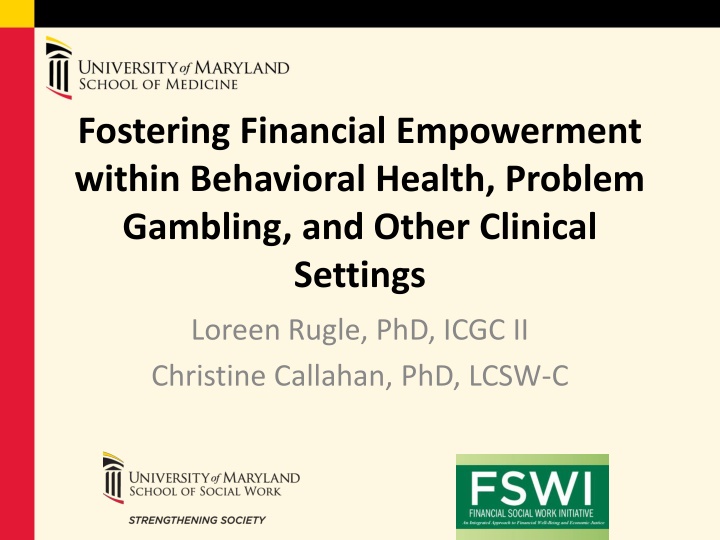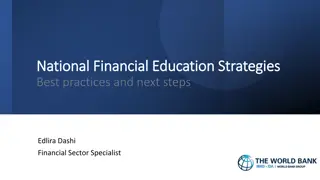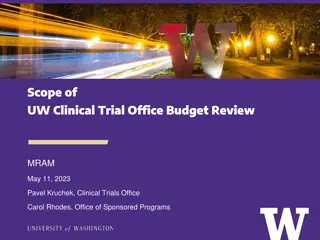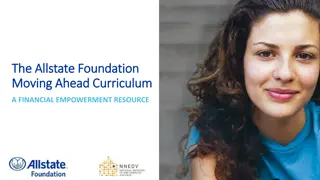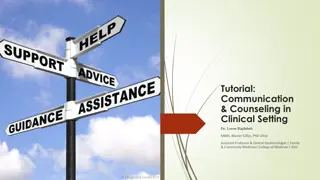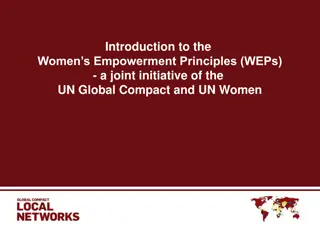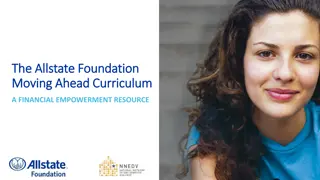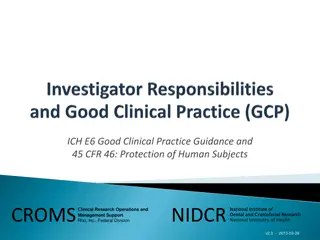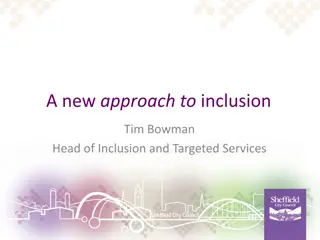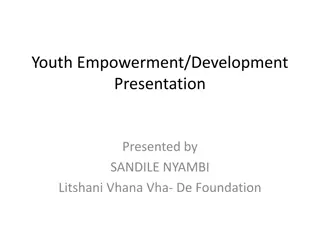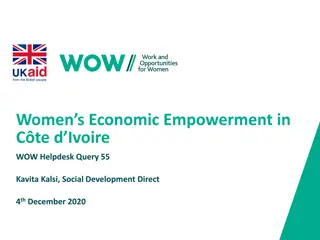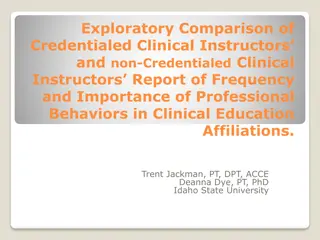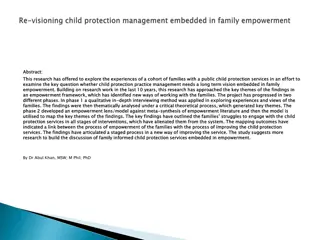Fostering Financial Empowerment within Clinical Settings
This presentation highlights the importance of integrating financial capability in clinical practice, addressing issues like income struggles, debt, and enhancing financial well-being. It emphasizes the connection between financial and emotional stress, advocating for interventions that consider both aspects.
Download Presentation

Please find below an Image/Link to download the presentation.
The content on the website is provided AS IS for your information and personal use only. It may not be sold, licensed, or shared on other websites without obtaining consent from the author.If you encounter any issues during the download, it is possible that the publisher has removed the file from their server.
You are allowed to download the files provided on this website for personal or commercial use, subject to the condition that they are used lawfully. All files are the property of their respective owners.
The content on the website is provided AS IS for your information and personal use only. It may not be sold, licensed, or shared on other websites without obtaining consent from the author.
E N D
Presentation Transcript
Fostering Financial Empowerment within Behavioral Health, Problem Gambling, and Other Clinical Settings Loreen Rugle, PhD, ICGC II Christine Callahan, PhD, LCSW-C
FIRST POLL Do your clients struggle with any of the following issues related to finances? Not enough income and/or trying to stay afloat Difficulty getting economic stimulus, Unemployment Insurance Too much debt and/or credit problems Pretty much all of these None of these
FINANCIAL SOCIAL WORK INITIATIVE AT THE UNIVERSITY OF MARYLAND SCHOOL OF SOCIAL WORK Founded in 2008 Research, training, policy and practice advocacy in the areas of financial capability and financial empowerment Focus on vulnerable populations and communities
FINANCIAL CAPABILITY IS According to Margaret Sherraden Combines a person s ability to act with their opportunity to act More than financial education Must have access to financial products and services that allow them to act in their best financial interest Leads to improved financial well-being and life chances
FINANCIAL CAPABILITY CONCEPTS IN CLINICAL PRACTICE Need to: Integrate financial and psychosocial aspects of counseling Recognize that a host of problems contribute to financial & emotional distress/devastation (life-threatening illness, aging at times, interpersonal violence, foreclosure, job loss) Address problems in a comprehensive, holistic way Recognize that financial and emotional stress are closely intertwined Identify helping professionals to be skilled in/comfortable with these areas with assessment and intervention
CONCEPTS (continued) Development of interventions that address financial and psychosocial realities Development of new surveys measuring financial realities, capability, knowledge, self-efficacy Addressing poverty and income inequalities through policy and legislation Establishing partnerships among schools, agencies, practitioners, macro social workers, and others
BACKGROUND Addressing financial distress in human service programs Connections between financial well-being and overall psychosocial well-being Beyond income, amount of rent, obligations, etc., are there struggles around debt, insufficient income, credit or banking problems, predatory lenders, other stressors?
CLIENTS ASSESSMENT What to consider: Does monthly income cover ongoing expenses? Is income stable every 2 weeks or month? Are they receiving any public benefits? Are they eligible for any public benefits that they are not receiving? Is there an impact on working ability?
FINANCIAL DISTRESS AND RELATED ISSUES DURING PANDEMIC Drastic loss of work and income Workers on the front lines Hourly workers Self-employed; gig workers Telework challenges and changes Stress and balance with child care and school responsibilities Housing instability; now looming evictions
IMPACT OF COVID-19 ON PEOPLE AND COMMUNITIES OF COLOR Health and economic impacts are especially profound Systemic racism and inequality and poverty ravage communities of color Workers are more frequently on the front lines and exposed
PERSONAL FINANCE ISSUES WITHIN GAMBLING AND PROBLEM GAMBLING Financial strain and stress Chasing wins; chasing losses Greater risk of bankruptcy Relationship strain
Talking about money Why is it so hard to talk to clients about money and why is important to do it? Are there cultural aspects to talking about money? How do money, money problems, and money management fit into therapy? How far should a therapist go in making suggestions about money issues to their clients? How does talk about money issues fit into crisis management and ongoing counseling?
Experiences with Money 13 What was you first experience with money? What are your earliest memories of money in your family? What is your best and worst memory regarding money? What feelings do these memories generate? Was money viewed as good, bad, scary, dirty, or neutral for you as a child? Did anyone help you to understand these feelings as a child? Were there any family stories about money?
Managing Money How do you feel when you go to a bank? How do you feel when you pay your bills? How do you feel when you balance or review your accounts? How do you feel when/if you meet with a financial advisor or accountant? How do you feel when you have conversations about money with family members?
Gambling and Financial Wellness How much do you budget for fun, recreation, entertainment? What part of that do you budget for gambling? How do you make those decisions?
Gambling and Financial Wellness What role does gambling play in your financial planning? Do you see gambling as a solution to financial problems? Do you see gambling as a way to supplement your income?
Real Money And Gambling Money Adapted From A Paper By Julian Taber, 1999 Gambling money cannot be used for anything but gambling Once money undergoes a cognitive conversion into gambling money it is never converted back to real money Gambling money is never really lost
Real Money And Gambling Money Adapted From A Paper By Julian Taber, 1999 ALL ACCIDENT OR UNEXPECTED INCOME IS AUTOMATICALLY CONVERTED TO GAMBLING MONEY: A GIFT FROM LADY LUCK NEEDS TO BE SPENT IN HER WORSHIP REAL MONEY COMING AS LOANS FROM OTHERS IMMEDIATELY BECOMES GAMBLING MONEY WHEN DOES $20 = $20?
Real Money And Gambling Money Adapted From A Paper By Julian Taber, 1999 PAYING FOR TREATMENT WITH REAL MONEY? CAN T YOU GIVE ME THE ODDS ON RECOVERY? REAL TIME/GAMBLING TIME REAL PEOPLE/GAMBLING PEOPLE
Assessment Begin money conversation All sources of income Financial consequences of gambling Realize this discussion is a process What are financial goals of person with gambling disorder What are family s financial goals
Assessment Ideally have money conversation with individual with the gambling problem and with family members Who knows what about family finances How separate or co-mingled are finances Who has managed family finances How have financial decisions been made How has extended family been involved or impacted by financial issues
Motivation and Finances I ll do whatever it takes Except .
Stop Gambling Motivation and Finances Budget Money Protection Plan
Finances Gambling Motivation Recovery Motivation List Debt
Financial Planning for Recovery CC Six Stage Model (ala GA Budget and Pressure Relief) Clarify Debt/Current Financial Situation Identify/Predict Income Identify Expenses Create Budget/Make Adjustments Debt Repayment Plan Money Protection Plan
Assessing Debt How much Have you borrowed from friends, family, co-workers (whether or not they expect to be paid back) How many credit cards, how much owned on each? Behind on payments? Loans Home equity Car Home Bank, credit union Payday Other loan companies
Assessing Debt How much Behind on rent/mortgage Behind on utilities Behind on phone, cable Taken from savings, retirement, investments Owe casinos Owe bookies Owe loan sharks
Assessing Debt Owed To Amount % Interest Min. Respons Priority Payment 28
Assessing Current Financial Situation Damage to credit ratings/credit score Limited cash flow, loss of job, business Foreclosures, repossessions Loss of medical/other benefits Reliance on or need for public assistance Loss of valuables Harassment from debt collectors
Assessing Current Financial Situation Recommendations for Partners Know your legal rights and liabilities Get support for beginning to address finances Check all accounts (banks, IRAs, Retirement, Investment, etc) and get statements for the last 90 days Check credit scores and personal credit reports Check status of all payments (mortgage, rent, car, utilities etc) Take inventory of all valuables Get help and support
Defining Income Income Source Date Received Paid To Amt after Deductions 31
Defining Income and Sources for Gambling Money Paychecks Tips, gratuities, commissions Cash Payments Selling Property (Ebay, etc) Interest Payments Insurance Payments Retirement Accounts Investments Cash value in insurance Home Equity Business equity Property Jewelry Car Electronics Art Antiques Collections Illegal Sources Access to money on job Dealing Drugs Prostitution Fraud
Estimating Expenses List only income you can count on. Use lowest estimate of commissions, tips, extra income. Use extra income for savings or toward special needs or large purchases. List all household and family expenses Include gambling debt and other debt repayment as an expense Include money for savings as a basic expense Include money for recreation and fun as a basic expense Include GA donation and treatment cost as basic expense For expenses that occur less than monthly calculate average monthly allocation
34 Example Average family annual income $97,881.00, monthly 8156.75 Assume family of four (2 children ages 2 and 6) Expenses: 3 bedroom apt 2,000 School & presch 1,000 Car/Trans 900 Food 1,500 Utilities 300 Internet & Phone 200 Clothing 400 tax 500 Health Care 600 Entertainment 300 Total 7,700 Income Expenses = 456.75
35 Example Gambling Debt: 50,000 Interest rate: 21% $1375.00/Mo
36 Adjustments Who is responsible? Who sacrifices? Work more, spend less or both? How to save money Make coupons your friend Avoid Rent-A-Center expenses Used cars How to eat healthy on a budget Bargain shop
37 Money Protection Plan How will we safeguard our money/assets from gambling? Who can help? To whom will I be accountable?
Money Protection Plan Issues to consider: Safety issues Knowledge and experience Family dynamics Cultural issues 38
39 Money Protection Plan: When Loved One is Working on Recovery Agree to explain their gambling problem to family and friends, makes commitment to restitution plan and asks them for their support in not lending any money.
40 Financial Planning for Recovery What Makes a Good Financial Plan? All parts of the financial planning process covered Gambler and family committed to using it All involved understand roles and responsibilities Realistic and supports recovery goals No bailouts - Support only with accountability It is clear and committed to writing
SECOND POLL Have your clients dealt with any of these issues since the pandemic? Financial distress or financial anguish Trying to escape problems Struggling to care for family, financial obligations More anxiety and stress More depression
CONCRETE INTERVENTIONS Unemployment Insurance (UI) Pandemic Unemployment Assistance and Other Legislation Economic Stimulus Checks Financial Crisis Counseling Connection with Critical Resources
PSYCHOSOCIAL INTERVENTIONS INVOLVING FINANCES Financial counseling Financial coaching Financial education Financial therapy
FINANCIAL COUNSELING One-time session; often drop-in Client in crisis* Counselor defined Ad hoc; often ends with initial session/restarts with next crisis More didactic and prescriptive Ad hoc; general assumption is client will follow through on intentions Referrals common and active (calls placed; appointments made); may take advocacy or mediation role on behalf of client
FINANCIAL COACHING More than 2 regularly scheduled sessions Client stable* but seeking improvement Client defined; Active listening and carefully directed questions to guide self-reflection Follow up and accountability are explicit and planned for each session Client responsible for own advocacy; referrals common but passive
FINANCIAL EDUCATION One to two set sessions Client stable but seeking specific information in identified area Client defined topic with educator teaching information More didactic, prescriptive, and typically with a set topic identified Client chooses what to do with information and carries out actions independently Referrals for additional information and relevant services provided for clients to act upon
FINANCIAL THERAPY Blending of financial counseling and therapeutic intervention techniques Multiple sessions Different techniques to explore the emotional side of money management, financial decision-making, and interpersonal impact Examples: financial genogram, financial landscape, financial mirror
OTHER POSSIBLE INTERVENTIONS/ TECHNIQUES Motivational Interviewing Pros and cons of each spending choice Quantify/Use tangible examples Mental accounting Probability discounting Open-ended questions Allison Deitz, LMSW and Jewell Banford, LCSW-C, University of Maryland, Baltimore
OTHER TOOLS TO AID INTERVENTIONS What's your money story?" The importance of contingency planning/mitigating risk
MARYLAND RESOURCES FOR EVICTION, FOOD BANKS, OTHER NEEDS CASH Campaign of Maryland www.cashmd.org Maryland Legal Aid https://www.mdlab.org/ Consumer Credit Counseling Services of Maryland www.cccsmd.org Baltimore City s soon-to-be-launched Financial Empowerment Center www.oedworks.com
